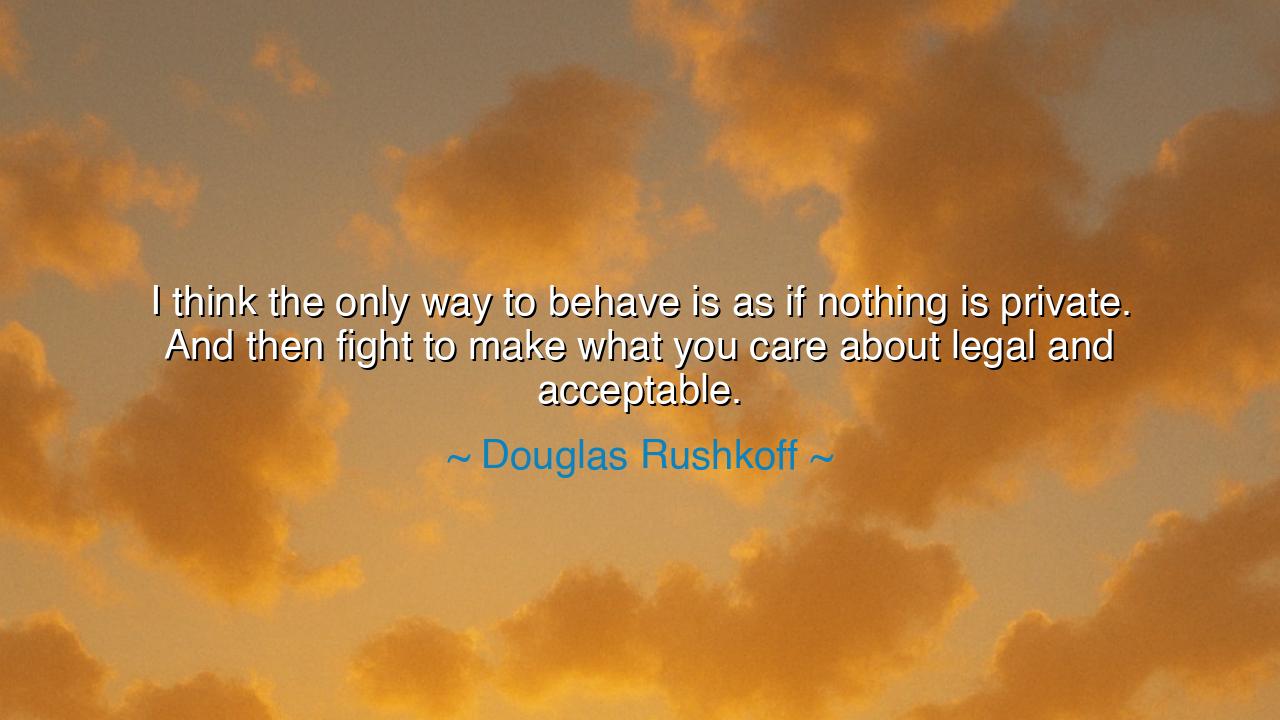
I think the only way to behave is as if nothing is private. And
I think the only way to behave is as if nothing is private. And then fight to make what you care about legal and acceptable.






There are truths that arise only when the age itself begins to tremble under the weight of its own invention. Douglas Rushkoff, a thinker of the digital era, spoke one such truth when he said: “I think the only way to behave is as if nothing is private. And then fight to make what you care about legal and acceptable.” These are not the words of fear, but of awakening — a recognition that in the modern world, the walls of secrecy have fallen, and the private soul now stands naked before the glowing eyes of the machine. His words summon us to live not in illusion, but in transparency, and to shape the moral laws of the world not through denial, but through courage.
The origin of this quote lies in the dawning of the digital age — a time when every whisper is recorded, every action archived, every movement traced by unseen networks of data. Rushkoff, one of the early prophets of media culture, saw that privacy was no longer a guarantee but a fading myth. Yet he did not call for despair. Instead, he offered a higher path: to behave as if nothing is private, not in surrender, but in integrity — to live so truthfully that exposure brings no shame. This is the discipline of the new age: to act in public as one acts in secret, to be the same person under the sun as under the shadow.
In ancient times, philosophers and saints spoke much of character — that true virtue is what a man does when no one watches. But Rushkoff reminds us that the age of unseen virtue has ended. The digital eye sees all. Thus, we must ascend to a higher virtue still — to live so openly and honorably that nothing we do requires concealment. This is not a demand for perfection, but for authenticity. The hypocrite will suffer in such a world, but the honest will thrive. To live as if nothing is private is to embrace truth as armor, to find freedom not in hiding, but in living rightly.
Yet Rushkoff’s wisdom does not end with acceptance; it calls for action. He urges us not merely to endure the loss of privacy, but to fight for what we care about — to make those things “legal and acceptable.” Here lies the heartbeat of his teaching: that laws must evolve with conscience. When old systems condemn new ways of life, the just must not retreat into secrecy; they must bring their cause into the open light and change the world around them. To fight for legality and acceptance is to transform shame into dignity, and fear into reform. Every movement for justice — from the abolitionists to the suffragists, from civil rights to digital rights — has walked this same path: what was once hidden becomes seen, and what was once forbidden becomes free.
Consider the story of Socrates, who lived not in secret, but in fearless openness. In a city that condemned truth as subversion, he chose to speak it still — to question, to provoke, to awaken. He could have hidden his beliefs to preserve his life, but he believed that a man’s virtue must be transparent, even before the hostile eyes of the state. His death became his triumph, for it revealed that the soul which hides nothing is invincible. In the same spirit, Rushkoff’s teaching is not about surrendering privacy, but about becoming unafraid of visibility — to let truth be seen, and through its light, to reform the laws that chain it.
His warning also bears a challenge to this age of constant exposure: if the world has stripped away our privacy, then we must build a society worthy of such openness. We must fight for decency, empathy, and fairness in the systems that now watch us. Let not surveillance serve tyranny, but transparency serve truth. Let every person act as if their deeds are written in the sky — not out of fear, but out of love for the kind of world they wish to leave behind. For in the light, hypocrisy dies, but justice grows strong.
So let this teaching pass on as a law of the new era: Live as though nothing is private, and love as though everything matters. Let your actions need no disguise, your beliefs no apology. And when the world deems your goodness unlawful, fight not to hide it, but to sanctify it in law. The age of shadows is ending; the age of mirrors has begun. In such a world, the only protection is truth, and the only path to freedom is courage. For the day will come when every hidden thing is revealed — and those who have lived with integrity will stand not in shame, but in light.






AAdministratorAdministrator
Welcome, honored guests. Please leave a comment, we will respond soon